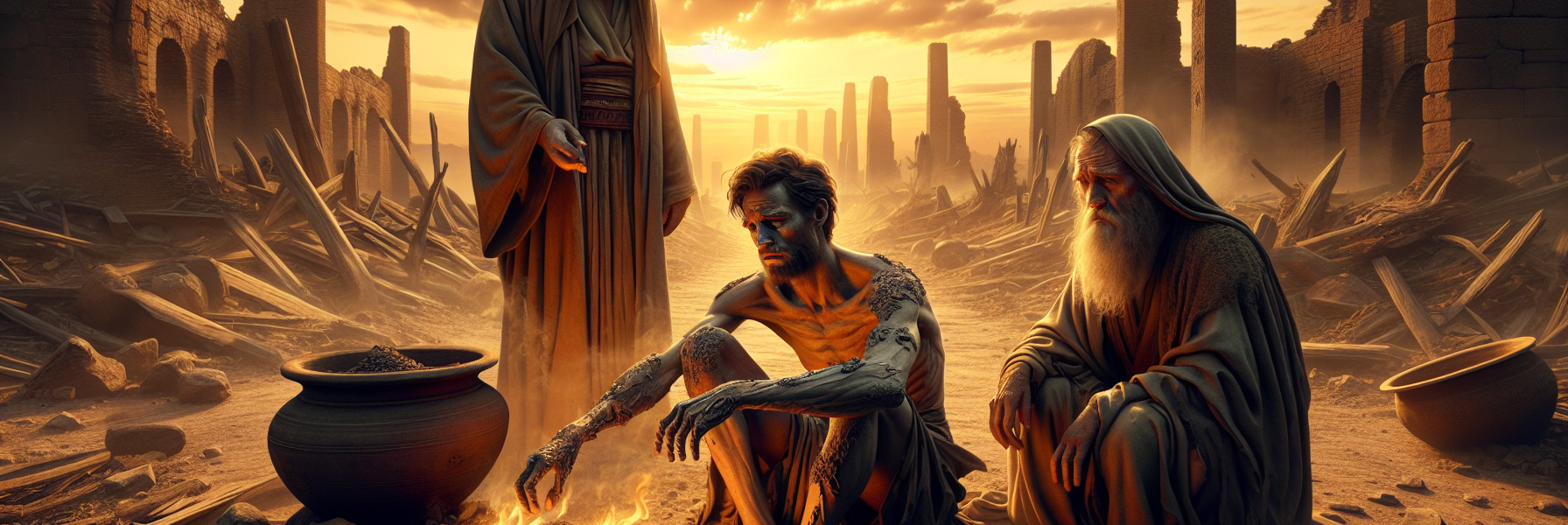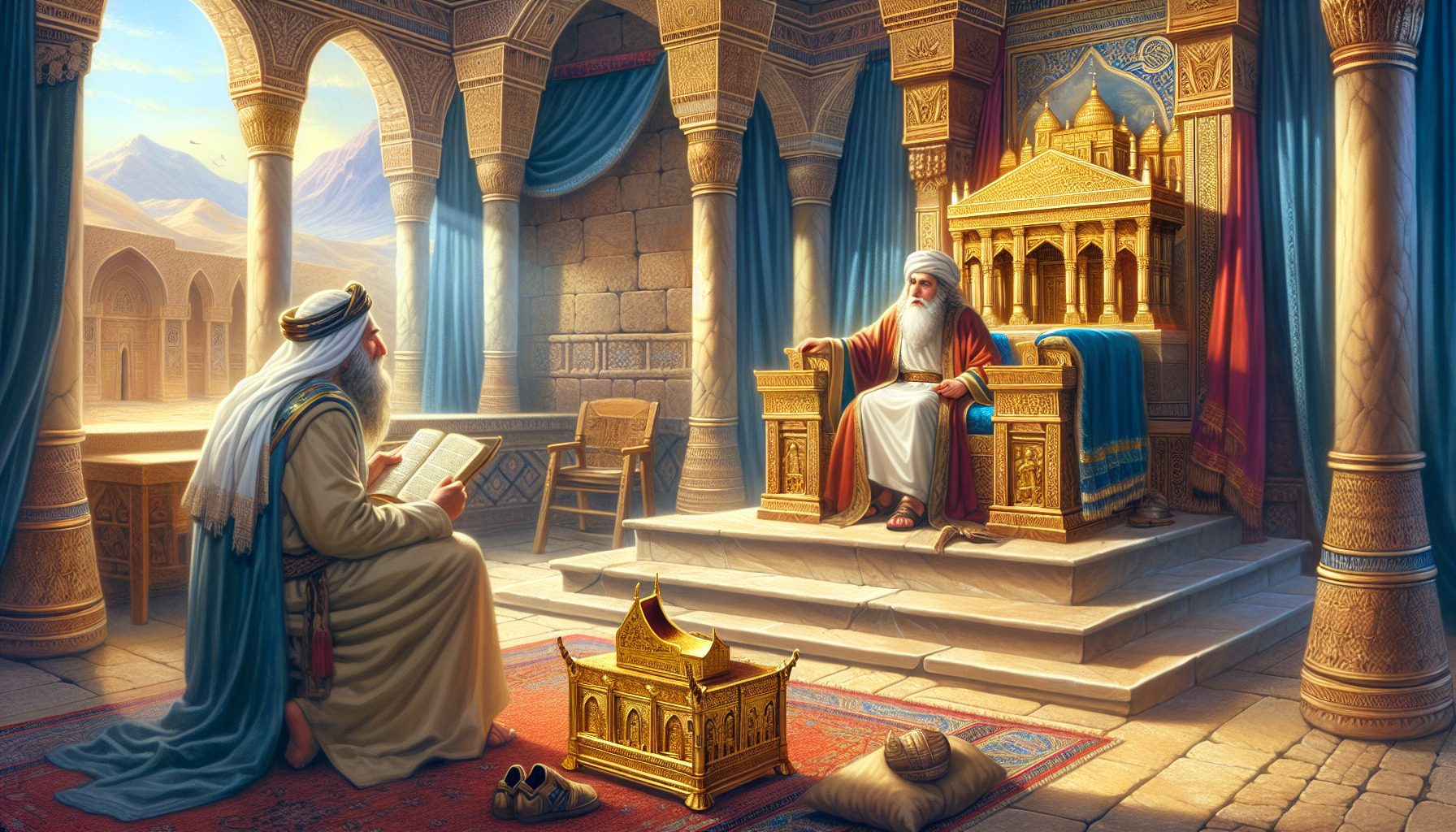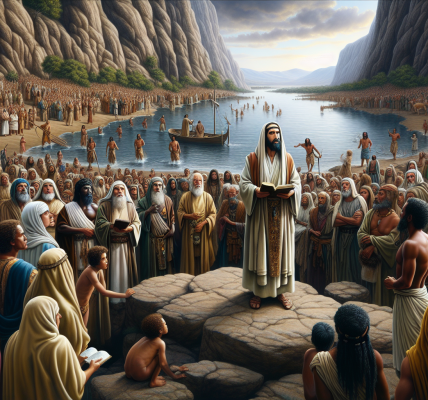**The Accusation of Eliphaz: A Story of Judgment and Mercy**
The sun hung low over the land of Uz, casting long shadows across the desolate ruins where Job once sat in ashes, scraping his sores with a broken piece of pottery. The wind howled through the empty streets, carrying whispers of sorrow and unanswered questions. Job’s friends had come to comfort him, but their words had turned to accusations, each one more biting than the last.
Now it was Eliphaz the Temanite who spoke again, his voice heavy with conviction, his eyes burning with the certainty of a man who believed he knew the mind of God. He leaned forward, his robes rustling like dry leaves, and fixed his gaze upon Job, who sat in silence, his body frail but his spirit unbroken.
**”Can a man be profitable to God?”** Eliphaz began, his tone edged with disdain. **”Surely he who is wise is wise for himself, and he who gains understanding benefits himself alone. Is it any pleasure to the Almighty if you are righteous? Or is it gain to Him if you make your ways blameless?”**
Job did not answer. His sunken eyes remained fixed on the ground, his lips moving in silent prayer.
Eliphaz pressed on, his words sharp as a blade. **”Is it because of your fear of Him that He reproves you and enters into judgment with you? Is not your wickedness great, and your iniquities without end?”**
The accusation hung in the air like a curse. Around them, the remnants of Job’s former life lay in ruins—his flocks stolen, his children dead, his body ravaged by disease. To Eliphaz, these were not the mysteries of divine sovereignty but the clear evidence of divine retribution.
**”For you have exacted pledges from your brothers for nothing,”** Eliphaz continued, his voice rising, **”and stripped the naked of their clothing. You have given no water to the weary, and you have withheld bread from the hungry. The mighty man possessed the land, and the favored man dwelt in it. But you have sent widows away empty, and the arms of the fatherless were crushed.”**
Job’s hands trembled, but not from fear—from grief. These were lies, cruel inventions meant to justify his suffering. He had clothed the naked, fed the hungry, defended the fatherless. Yet here he sat, condemned by the words of a friend who claimed to speak for God.
Eliphaz, mistaking Job’s silence for guilt, pressed his advantage. **”Therefore snares are all around you, and sudden terror overwhelms you. Is not God in the height of heaven? Behold the highest stars—how lofty they are! Yet you say, ‘What does God know? Can He judge through the thick darkness? Clouds veil Him so that He does not see, and He walks on the vault of heaven.'”**
Job’s breath came in shallow gasps. He had never spoken such words. He had never denied God’s justice, never claimed the Almighty was blind. But Eliphaz was relentless.
**”Will you keep to the old way which wicked men have trod?”** he demanded. **”They were snatched away before their time, their foundations washed away by a flood. They said to God, ‘Depart from us,’ yet He had filled their houses with good things.”**
The words struck Job like blows. He had lost everything, and now he was being counted among the wicked.
But then Eliphaz’s tone softened—not with compassion, but with the smug satisfaction of a man delivering a final warning. **”Yield now and be at peace with Him; thereby good will come to you. Receive instruction from His mouth, and lay up His words in your heart. If you return to the Almighty, you will be built up; if you remove injustice far from your tent, then you will delight yourself in the Almighty and lift up your face to God.”**
Job closed his eyes. The words were hollow. Eliphaz spoke as if repentance were a transaction, as if suffering were always the result of sin. But Job knew—somewhere deep in his spirit—that the ways of God were higher, His purposes beyond the understanding of men.
The wind stirred again, and in the distance, thunder rumbled. The heavens themselves seemed to groan under the weight of human presumption.
And Job, in the silence of his heart, waited for the voice of God.




